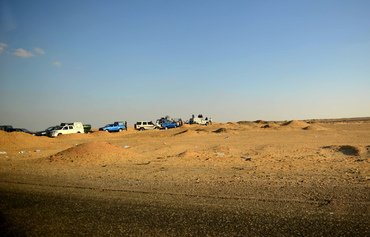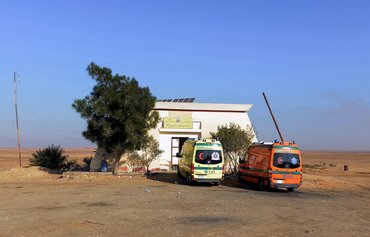Egypt executed on Saturday (June 27th) Libyan militant Abdel Rahim al-Mismari, who was convicted for an attack south of Cairo in October 2017 that killed 16 policemen, the defence ministry said.
The lethal attack took place in al-Wahat, about 200 kilometres south of the capital in the Western Desert, when a raid on a militant hideout was ambushed and a firefight ensued.
Al-Mismari was captured soon after. A military court found he had masterminded the attack and sentenced him to death in 2019, while 32 co-defendants received life sentences.
"He deliberately killed in a pre-meditated manner 16 police personnel," the defence ministry said in a video outlining the charges against him.
![A picture taken on October 22nd, 2017 shows a view of the Cairo-Bahariya Oasis desert road, south-west of the capital Cairo. [Mohamed el-Shahed/AFP]](/cnmi_am/images/2020/06/29/24751-Cairo-Bahariya-road-600_384.jpg)
A picture taken on October 22nd, 2017 shows a view of the Cairo-Bahariya Oasis desert road, south-west of the capital Cairo. [Mohamed el-Shahed/AFP]
The seven-minute clip, edited with a dramatic score, listed 11 charges against him.
Al-Mismari was also charged with kidnapping Mohamed Alaa al-Hayes, a policeman, who was later freed by Egypt's counter-terrorism forces.
In a 2017 interview with prominent talk show host Emad Adib, some of which was used in Saturday's defence ministry statement, a bearded al-Mismari appeared defiant and admitted to killing those he deemed "infidels".
He said he had adopted an al-Qaeda-based ideology.
He was accused of forming and joining a "terrorist" group in Libya, targeting security personnel, murder and carrying out hostile operations against vital facilities, according to the defence ministry.
The attacks largely centered on the turbulent North Sinai region, with others in the Western Desert along the porous border with Libya.
In March, Hesham Ashmawi, the Egyptian leader of al-Qaeda-linked al-Mourabitoun, was executed over involvement in several high-profile attacks after he was extradited from Libya in 2019.
Ashmawi led Ansar Bayt al-Maqdis in Egypt's Sinai, but broke with the group after it pledged allegiance to the "Islamic State of Iraq and Syria" (ISIS).

![A picture taken October 21st, 2017 shows an Egyptian security forces' armoured personnel carrier parked on the desert road towards the Bahariya oasis in Egypt's Western desert, near the site of an attack that left at least a dozen policemen killed. [Mohamed el-Shahed/AFP]](/cnmi_am/images/2020/06/29/24752-Egypt-security-forces-600_384.jpg)






